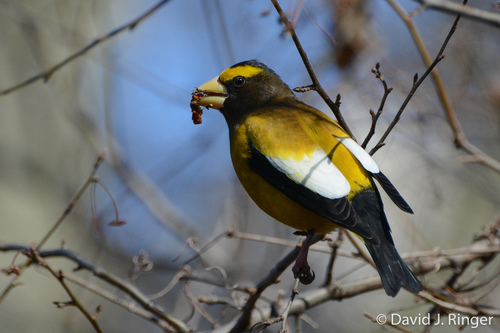A Manhattan milestone ... and a change of scenery
I got a vivid, raw reminder last night of the untamed life around us in New York City -- a sudden buzz and a thunk on the hood of a car, a cicada in the grasp of a killer wasp.
An Eastern Cicada-killer Wasp (Sphecius speciosus) takes a Swamp Cicada (Neotibicen tibicen) on West 22nd Street in Manhattan.
A Milestone
In early August, I slipped past 700 Research Grade taxa in the borough of Manhattan. That number contains so many surprises, achievements, and shared experiences with other generous naturalists. It's hard to know how to sum it all up or choose representative moments from so much diversity: hairstreaks and herons, lichens and leaf miners, tunicates and turtles.
I don't think it's immodest to say that naturalists in New York City are magicians who move with ease between parallel worlds. Choose your metaphor -- a TARDIS, a magic wardrobe, Platform 9¾ -- our own senses and intentions have at least as much power and our worlds as much wonder.
For thousands of non-human species, this city is a proving ground, a crossroads, a dying world, a new frontier, an exotic stopover, or just plain old home. That we can bear witness to their lives, even coming to know them in some small way, is boundlessly profound.
A Change
Much as I love New York and all its living things, I've decided to take a leave of absence for a few months. I'm going to spend the fall and winter in the Rio Grande Valley of Texas, and I'm really, really excited. It's not a permanent change -- I'm coming back to New York City next spring -- but it'll be the longest stretch of time by far that I've spent outside NYC in almost a decade.
I'm enjoying my last few weeks in the city as best any of us can under the circumstances. While I'm away, I'll certainly keep up with observations here on iNaturalist, including projects like Butterflies of New York County and helping out with IDs where I can.
Some Favorites
Blackburnian Warbler (Setophaga fusca), which I cherish each May as they return from the Andes.
A Common Snapping Turtle (Chelydra serpentina), whose species stubbornly thrives here.
New York state's first Cassius Blue (Leptotes cassius) at Hudson River Park in Chelsea.
Virginia Saxifrage (Micranthes virginiensis) Inwood Hill Park.
A thorn-mimicking Wide-footed Treehopper (Campylenchia latipes) at Hudson River Park.
Native Marsh Fleabane (Pluchea odorata) at the edge of an empty lot in Chelsea.
An Evening Grosbeak (Coccothraustes vespertinus) who overwintered at Riverside Park
Hidden Goldspeck Lichen (Candelariella aurella) growing in the mortar of a wall.
Feeding marks left by Norvellina chenopodii on Lamb's Quarters.
The brilliant Dogbane Leaf Beetle (Chrysochus auratus) on Hemp Dogbane.
Blue Toadflax (Nuttallanthus canadensis), now rediscovered in NYC
Synidotea laticauda (provisionally) discovered on Randalls Island with @susanhewitt.
Brant (Branta bernicla) #2237-01767, banded on Southampton Island (Shugliaq) in the Canadian Arctic
Common Buckeye (Junonia coena) showing dazzling universes of color.
Thank you
Nearly 500 people have contributed identifications to my New York County observations; scores more have made reports and created reference materials that have helped me know where to go and what to see there. And it's so rewarding to go out together, as many of us have. I have learned something from each of you -- thank you.
And to some of my top identifiers, especial thanks: @susanhewitt, @sadawolk, @wayne_fidler, @elevine, @nycbirder, @novapatch, @mertensia, @tarpinian, @danielatha, @dendroica, @kdstutzman
See you next spring!



















Comments
Enjoy your time in the RGV! I hope you see lots of new plants and butterflies.
Have a wonderful adventure and get home safe. Onward and upward and may your mode of transport be bigger on the inside. (I got nothing for the Harry Potter reference which tells you something about my age.)
Hope to meet you one day, neighbor!
We welcome you to TX!!! :)
Have a good time in Texas!
I envy you your trip to, and stay in, South Texas, part of the tropical USA. To migrate and overwinter there sounds like a great plan!
All the NYC organisms, including us humans, will be happy to welcome you back once spring 2021 rolls around.
Susan
Add a Comment